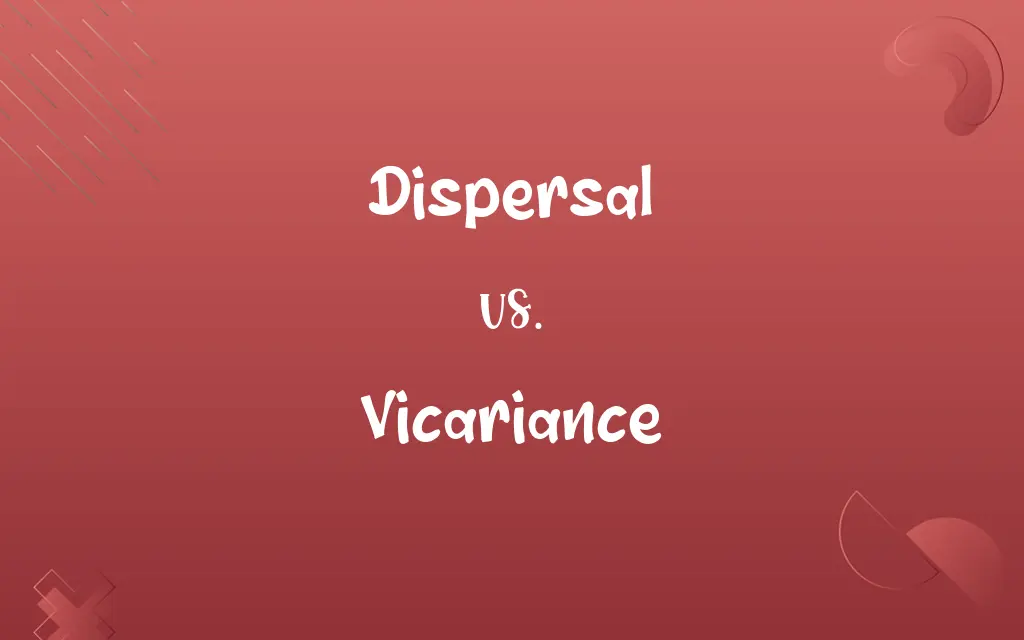Dispersal vs. Vicariance: Know the Difference

By Shumaila Saeed || Updated on December 25, 2023
Dispersal refers to organisms spreading from a central point, while vicariance involves a population being split by a geographical barrier.

Key Differences
Dispersal is a process in which organisms move or are carried away from their original habitat or population center. This movement can be due to various factors such as searching for food, habitat changes, or breeding purposes. Vicariance, on the other hand, is the geographical separation of a population of organisms by a barrier, leading to speciation. This barrier can be physical, like a mountain range or a river, causing the population to evolve into distinct species over time.
Shumaila Saeed
Dec 18, 2023
In dispersal, the focus is on the movement of individuals or groups to new areas. This can happen over generations or as a sudden migration. The key aspect is that the organisms leave their original location. In contrast, vicariance does not involve the physical movement of organisms. Instead, it involves a pre-existing population being divided by an external change in the environment, like continental drift or the formation of a new river.
Shumaila Saeed
Dec 18, 2023
Dispersal can lead to a wide range of outcomes, from the successful establishment of a population in a new area to the failure to adapt and eventual extinction. This process can result in increased genetic diversity if the dispersing individuals successfully integrate and reproduce in the new location. Vicariance, however, often results in reduced gene flow between the separated populations, leading to divergent evolutionary paths as each group adapts to its specific environment.
Shumaila Saeed
Dec 18, 2023
When discussing dispersal, it's important to consider the mechanisms behind it. These can include natural forces like wind or water currents, or actions by the organisms themselves, like flying or swimming. Vicariance is usually the result of large-scale geological or climatic changes. This process is often slower and affects a larger group of organisms simultaneously.
Shumaila Saeed
Dec 18, 2023
Dispersal can be a key factor in the colonization of new habitats and the spread of species across different geographical areas. It's a dynamic process that reflects the adaptability and resilience of organisms. Vicariance, by its nature, leads to more isolated populations and can be a major driver in the formation of new species, as isolated populations evolve independently.
Shumaila Saeed
Dec 18, 2023
ADVERTISEMENT
Comparison Chart
Definition
Movement of organisms away from their original location
Separation of a population by geographical barriers
Shumaila Saeed
Dec 18, 2023
Cause
Active movement or environmental factors
Geological or climatic changes
Shumaila Saeed
Dec 18, 2023
Outcome
Potential colonization of new areas, increased genetic diversity
Speciation, reduced gene flow
Shumaila Saeed
Dec 18, 2023
ADVERTISEMENT
Example
Birds migrating to new regions
Formation of a mountain range splitting a species into two groups
Shumaila Saeed
Dec 18, 2023
Dispersal and Vicariance Definitions
Dispersal
The act of distributing things over a wide area.
The aerial dispersal of pollen helps in cross-pollination.
Shumaila Saeed
Dec 11, 2023
Vicariance
The geographical separation of a population by a physical barrier.
The vicariance caused by the river led to the development of distinct fish species on either side.
Shumaila Saeed
Dec 11, 2023
Dispersal
The process by which a species expands its habitat.
The rapid dispersal of the invasive species threatened the local ecosystem.
Shumaila Saeed
Dec 11, 2023
Vicariance
A process in evolutionary biology where species are divided.
Vicariance played a key role in the diversification of island species.
Shumaila Saeed
Dec 11, 2023
ADVERTISEMENT
Dispersal
The scattering of a population into new areas.
The dispersal of the tribe across the continent was due to climate change.
Shumaila Saeed
Dec 11, 2023
Vicariance
The formation of new species due to geographical isolation.
Vicariance events in the rainforest have led to a high level of endemism.
Shumaila Saeed
Dec 11, 2023
Dispersal
The spread of organisms from a central point.
The dispersal of seeds by the wind is a key process in the forest's regeneration.
Shumaila Saeed
Dec 11, 2023
Vicariance
The division of a habitat by a new barrier.
The construction of the dam resulted in vicariance for the local aquatic species.
Shumaila Saeed
Dec 11, 2023
Dispersal
The movement of individuals away from their birthplace.
Animal dispersal is often motivated by the search for food and mates.
Shumaila Saeed
Dec 11, 2023
Vicariance
The splitting of a species' range due to environmental changes.
Continental drift is an example of vicariance affecting global biodiversity.
Shumaila Saeed
Dec 11, 2023
Dispersal
The act or process of dispersing or the condition of being dispersed.
Shumaila Saeed
Dec 10, 2023
Vicariance
The division of a widespread group of organisms by a geographic barrier, such as a mountain range or a body of water, often resulting in the evolution of related species on either side of the barrier.
Shumaila Saeed
Dec 10, 2023
Vicariance
(biology) The separation of a group of organisms by a geographic barrier, resulting in differentiation of the original group into new varieties or species.
Shumaila Saeed
Dec 10, 2023
Vicariance
(geology) The geological event which produces such a barrier (volcano, earthquake, etc)
Shumaila Saeed
Dec 10, 2023
Vicariance
The act of experiencing an event by proxy through an empathic link with the person who is experiencing the event firsthand.
Shumaila Saeed
Dec 10, 2023
Dispersal
The act of dispersing or diffusing something;
The dispersion of the troops
The diffusion of knowledge
Shumaila Saeed
Dec 10, 2023
Repeatedly Asked Queries
Can dispersal lead to speciation?
Yes, if the dispersing organisms successfully establish themselves in a new area and evolve separately from their original population.
Shumaila Saeed
Dec 18, 2023
How does dispersal affect species distribution?
Dispersal can lead to the spread of species across different geographical areas and potentially the colonization of new habitats.
Shumaila Saeed
Dec 18, 2023
What is an example of dispersal in animals?
Bird migration is a common example of dispersal, where birds move seasonally between breeding and wintering grounds.
Shumaila Saeed
Dec 18, 2023
What causes dispersal in nature?
Dispersal is caused by various factors, including searching for food, breeding, environmental changes, or natural forces like wind and water currents.
Shumaila Saeed
Dec 18, 2023
How does vicariance affect biodiversity?
Vicariance can increase biodiversity by creating new niches and leading to the evolution of new species.
Shumaila Saeed
Dec 18, 2023
What is dispersal in biology?
Dispersal refers to the movement of organisms away from their birthplace or population center to new areas.
Shumaila Saeed
Dec 18, 2023
What is vicariance in evolutionary biology?
Vicariance is the division of a population into separate groups due to a geographical barrier, often leading to speciation.
Shumaila Saeed
Dec 18, 2023
Can vicariance lead to new species?
Yes, vicariance can lead to new species as isolated populations evolve independently.
Shumaila Saeed
Dec 18, 2023
How does vicariance differ from dispersal?
Vicariance involves splitting a population through environmental barriers without movement, while dispersal involves active movement to new areas.
Shumaila Saeed
Dec 18, 2023
What is an example of vicariance in nature?
The formation of the Great Rift Valley in Africa leading to the separation of animal populations is an example of vicariance.
Shumaila Saeed
Dec 18, 2023
Can human activities cause dispersal?
Yes, human activities like habitat destruction or introduction of species to new areas can cause dispersal.
Shumaila Saeed
Dec 18, 2023
What role does dispersal play in ecosystem dynamics?
Dispersal plays a key role in ecosystem dynamics by affecting species distribution, genetic diversity, and community composition.
Shumaila Saeed
Dec 18, 2023
Is vicariance a common process in island biogeography?
Yes, vicariance is a common process in island biogeography, contributing to the unique species found on islands.
Shumaila Saeed
Dec 18, 2023
Can climate change influence dispersal patterns?
Yes, climate change can influence dispersal patterns by altering habitats and resource availability, prompting species to move to suitable environments.
Shumaila Saeed
Dec 18, 2023
Can vicariance occur in aquatic environments?
Yes, vicariance can occur in aquatic environments due to factors like the formation of new water bodies or changes in water currents.
Shumaila Saeed
Dec 18, 2023
Does dispersal always involve physical movement?
Yes, dispersal involves the physical movement of organisms, either actively or passively, to new locations.
Shumaila Saeed
Dec 18, 2023
Does dispersal always result in successful colonization?
No, dispersal does not always result in successful colonization; it depends on various factors like adaptability and environmental conditions.
Shumaila Saeed
Dec 18, 2023
How do vicariance events affect genetic diversity?
Vicariance usually reduces gene flow between separated populations, which can lead to divergent evolutionary paths and genetic differentiation.
Shumaila Saeed
Dec 18, 2023
How does dispersal contribute to invasive species problems?
Dispersal contributes to invasive species problems when non-native species spread rapidly in new environments, often outcompeting local species.
Shumaila Saeed
Dec 18, 2023
Are human-caused barriers considered in vicariance?
Yes, human-caused barriers like roads or dams are considered in vicariance as they can split populations and affect species evolution.
Shumaila Saeed
Dec 18, 2023
Share this page
Link for your blog / website
HTML
Link to share via messenger
About Author
Written by
Shumaila SaeedShumaila Saeed, an expert content creator with 6 years of experience, specializes in distilling complex topics into easily digestible comparisons, shining a light on the nuances that both inform and educate readers with clarity and accuracy.








































































